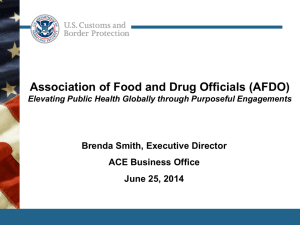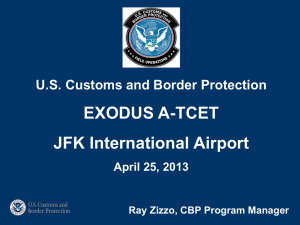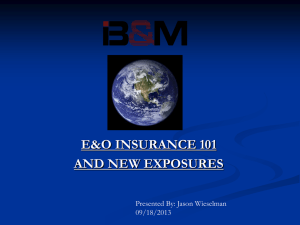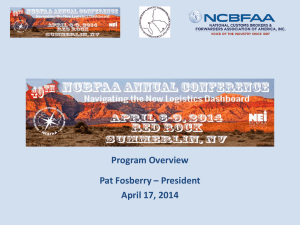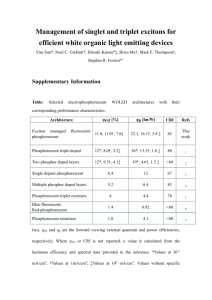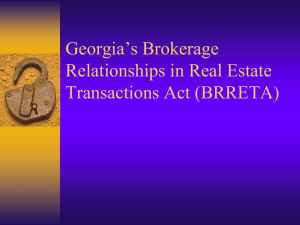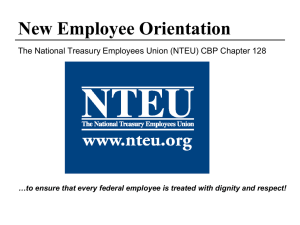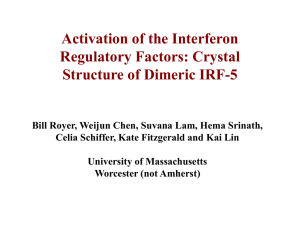Changes to Broker Regulations - Customs Brokers & International
advertisement
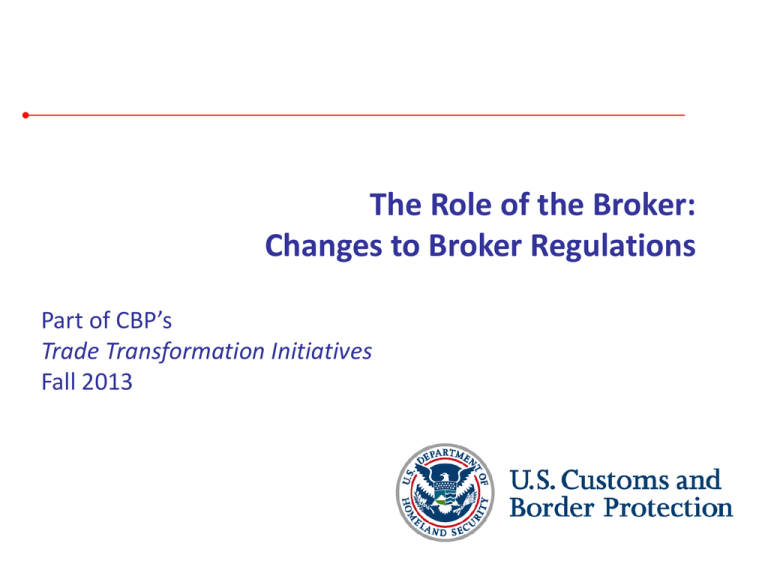
The Role of the Broker: Changes to Broker Regulations Part of CBP’s Trade Transformation Initiatives Fall 2013 Background • Role of the Broker-Broker Regulatory Revision Workgroup – Established January 2011 by CBP in partnership with NCBFAA • COAC Role of the Broker Working Group – Part of COAC Trade Modernization Subcommittee – Submitted position paper outlining 17 recommendations for CBP to consider (October 4, 2011) – Key recommendation: CBP should recognize the broker’s role as a communicator and force multiplier to increase compliance, especially for small- and medium-sized importers Key elements of this initiative • Overhaul the broker regulations contained in 19 CFR Part 111 (Customs Brokers) – – – – – – – Broker examination Licensing Permits Definitions Relationship with freight forwarders Triennial reporting Importer bona fides • Add regulations on continuing education Broker Examination/Licensing • Account for electronic processes – Online exam registration and payment – Global Enrollment System for license applications • Changes in CBP’s license applicant vetting processes • Reflect organizational changes within CBP and DHS Broker Permitting • Should CBP reconsider current permitting requirements, which are based on geographical location? Broker Permitting • Permitting is outdated – Both CBP and brokers are moving toward centralization and virtual environments • Permitting is provided for in statute – Absent a legislative change, what can we do to make permitting more business friendly? Broker Permitting Options • • • • Eliminate permit requirement entirely Move to national permit only Broaden district permit waivers Delineate geographical areas based on time zones or in some other reasonable manner • Increase the district permit waiver from 1 year to 3 years Importer Bona fides • Should brokers be required by regulation to collect some minimal information on their clients before agreeing to conduct customs business on their behalf? Importer Bona fides • Overwhelming majority of brokers support a “level playing field” through the regulation of bona fides (rather than simply provide guidance) • A short checklist (5 to 10 items) would be preferred over a “plan” submitted by the broker describing how importers are validated (would modify Part 141) • While CBP supports and encourages in-person visits and review of financial documents, we recognize that this is not always feasible Importer Bona fides (continued) • CBP is considering using CBP trusted trader status to satisfy bona fides requirements • CBP Form 5106 (Importer ID) is being overhauled to more meaningfully capture information about an importer Continuing education • Should continuing education be mandated in order to hold a customs broker license? Continuing education • Almost all professional licenses have a continuing education or minimum training requirement— staying current is important • Broker community is mixed but tips positive; still some hesitation that education should be mandated • Expanded CBP‐broker workgroup convened in February 2013 – Group developed framework for continuing education – Requirements are for individual license holders How many hours will I need? • Individual license holders will be required to take 40 hours of continuing education over 3 years • This equates to about 1 hour of education a month • Anything much more than this will be perceived in the broker community as too burdensome • Anything much less than this will not be a meaningful level of education for a professional license Won’t this be hard to obtain? • Low cost/no cost education opportunities are very important to both CBP and the broker community • “Education” will include activities beyond the traditional classroom setting • Travel should not be necessary in order to obtain quality continuing education Who can provide accredited education? • CBP will determine which individuals or entities can accredit coursework • CBP will not do accreditation (resource constraints) • CBP will announce an open season to receive applications from outside entities who are interested in evaluating and accrediting quality coursework • CBP will select a small pool from the applicants (probably 5 to 10) • After 5 years, CBP will have another open season and all hopeful accreditors (including incumbents) could apply again How do I report my credits to CBP? • CBP will automate the triennial report • Certify your credit hours along with your triennial report and fee • If any of these four things is missing from your triennial submission… 1) Indication that you are active 2) Certification of your education credits 3) Triennial report 4) Triennial fee … then you are issued a suspension notice – You then have 60 days to respond to CBP to fill in the gap(s) – If you do not respond, your license is revoked by operation of law Continuing education (continued) • COAC Recommendations: – Minimum of 40 hours over 3 years – Minimum of 32 hours must be accredited – CBP should take a measured, commercially reasonable approach to the 40 hours continuing education requirement for customs brokers wishing to reactivate a license that is inactive – Reporting of continuing education should be tied into the triennial reporting – Reporting of the license holder and the reporting of continuing education be done together in ACE Proposed regulations • Result of co-creation – CBP is incorporating feedback from Summer 2012 roundtables, the CBP webinars, the NCBFAA workgroup, the CBP-trade workgroup on continuing education, NBCBA, PCC, Congressional staffers, and the COAC – This feedback has been critical to our policy development • Nothing is final; many details to be developed • CBP is currently making the final decisions to begin drafting the Notice of Proposed Rulemaking Proposed regulations • Internal consultations – Several meetings per week between Broker Management Branch and RR attorneys – Consulting port personnel and other relevant parties • Economic analysis required • Legal reviews within CBP; and DHS, Treasury, and/or OMB reviews could alter course Proposed regulations: Next steps • CBP is waiting for two COAC recommendations: – Importer bona fides – Permitting modernization • CBP also awaits guidance from the NCBFAA broker workgroup on permitting modernization Other Issues • ACE Update • Broker Exam • Broker-Known Importer Trusted Trader Program 21 Websites and communication tools Questions/Comments/Concerns related to the regulatory rewrite, email us at RoleoftheBroker@cbp.dhs.gov Questions/Comments/Concerns related to general broker management, email us at BrokerManagement@cbp.dhs.gov Our Broker Management website: http://www.cbp.gov/xp/cgov/trade/trade_programs/broker/ Our trade transformation website: www.cbp.gov/xp/cgov/trade/trade_transformation/
